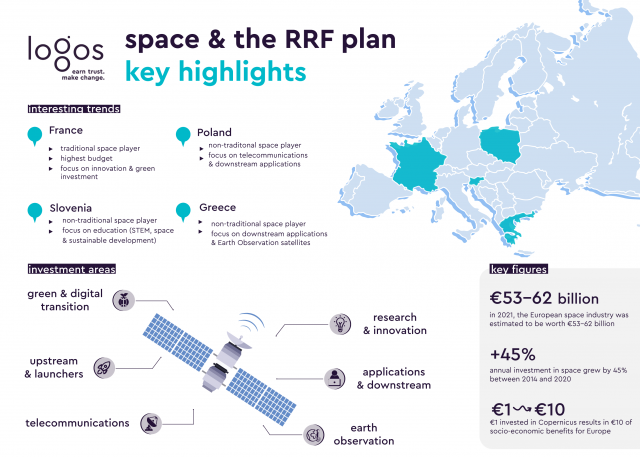
space
Investing in space: EU bets on the Final Frontier
To many, space can seem like a realm reserved for governments, scientists and engineers, detached from everyday issues and lives. Pouring millions of euros into the space sector can therefore seem like lost money.
However, space is already playing a crucial role in our daily lives, from satellite navigation and telecommunications to environmental monitoring and emergency response. In the current context, where the European Union and its Member States are striving to achieve a more digitalised and green post-pandemic society and economy, the role for space is only going to increase.
Over the last few years, investment in the European space sector has drastically increased from both public and private actors, with a 45% increase in just six years. And it is unlikely to stop anytime soon.
As France kicks off its six-month presidency of the Council of the EU, we take a look at the economic significance of the European space sector and how it contributes to economic growth.
2020 saw a record €502 million invested in European space start-ups, despite the COVID-19 crisis.
Space: an asset for rebuilding after the pandemic
EU countries have recognised space as a profitable sector in recent years, crucial to building a more resilient and sustainable post-pandemic society and economy. In fact, many EU Member States have included space in their Recovery and Resilience Facility (RRF) plan.
The RRF is the most significant component of the Next Generation EU (NGEU) fund, the European Union’s instrument that aims to mitigate the economic and social impact of the coronavirus pandemic, making available to Member States €723.8 billion (in current prices) in loans (€385.8 billion) and grants (€338 billion).
So far, 26 out of 27 Member States have submitted their plans and just under half of them have explicitly included actions related to space. These include traditional European space countries such as France, Italy, and Spain and new space actors such as Greece, Poland, and Slovenia.
Countries foresee investments in different space applications, including the aerospace industry, earth observation, climate and dual technologies. Nevertheless, one common element of the various national plans is research and innovation. States are not looking at the short term economic impact of the space sector. They consider space a growing industry with long-term and transversal benefits for the economy and society.
For example, although it is not a historical investor in space, Slovenia has included space as a new area to be added to the national educational programme in its RRF plan. This shows that Slovenia considers space a critical sector for the future and has decided to invest in the next generations to make Slovenia a strong space power.
[…] going from €50 million to €500 million, corresponding to a 45% increase in just six years (2014-2020).
The growing impact of space on the economy
EU Member States have not only recognised the role of space in building our post-pandemic society, but they have also increased their investment in this sector. 2020 saw a record €502 million invested in European space start-ups, despite the COVID-19 crisis. Since 2014, the space economy has recorded continuous and significant growth, going from €50 million to €500 million, corresponding to a 45% increase in just six years (2014-2020).
Nevertheless, doing business in space is still considered risky: it is a relatively new market sector associated with high costs. As a high-risk sector, public funding is crucial as a market signal for private entities’ investment to ensue. By increasing the number of space initiatives and projects over the last years, public institutions have provided the necessary call to boost the involvement of private actors in space. This has fostered the establishment of strong partnerships between public and private actors. For example, in 2020, 52% of investment deals in the space sector involved a mix of private and public funds, proving that the public sector has pushed private actors to take more risks in space, making way for the era of “New Space”.
While it is clear that investment in space has increased, it is not quite so easy to determine the return on investment and the contribution of space towards the EU’s economic growth. The reason for this is twofold. Firstly, space-based data and technologies have been fully integrated into our daily lives, enabling many essential public services and applications. Defence and security, telecommunications, transport, research, agriculture, environmental monitoring, emergency management and response are only some sectors that benefit from space. Additionally, research, space exploration and space services generate knowledge, technology transfer, innovation, and much more, all aspects which are difficult to quantify in economic returns.
However, some figures can explain how citizens are ultimately benefitting from investment in space.
In 2021, the European space industry, which includes manufacturing and services, employed over 231.000 professionals and was estimated to be worth €53-62 billion. The European industry sector is very competitive, and a third of the world’s satellites are manufactured on the continent. Figures show that every euro invested in Copernicus, the EU’s Earth observation programme, results in 10 euros of socio-economic benefits for Europe. Additionally, every euro invested in European Space Agency programmes corresponds to up to 6 euros created in the broader economy. Investing in ESA programmes also generates significant governmental revenues: up to 90% of the funding of ESA programmes are returned to governments as income tax, taxes on products (including value-added tax) and social security contributions.
In 2021, the European space industry, which includes manufacturing and services, employed over 231.000 professionals and was estimated to be worth €53-62 billion.
The French presidency: creating momentum for space
As a traditional space country, France plays a crucial role in the European space sector. It is unsurprising then that it has also defined space as one of the key priorities of its 6-month Council presidency. President Emmanuel Macron emphasised the need to build a solid EU space industrial sector to “make Europe a major continent for production, innovation and job creation”.
France is also known to strongly support achieving EU strategic autonomy in several key sectors to ensure EU industrial independence, economic growth and industrial competitiveness. Space is one of those critical sectors, where stakeholders are striving to achieve a European reusable launchers’ capacity (to replace dependence on Space-X) or put in place an EU-operated satellite connectivity constellation (to compete with Starlink, One Web and others).
However, it is also an enabler for achieving the twin digital and green transition and EU technological strategic autonomy. These considerations further highlight the vast role that space plays in the economy and the importance of continued investment in the upstream and downstream space sectors.
The French presidency of the Council is thus an opportunity for bold strategic thinking and investment in space, bringing much-needed visibility to the importance of space in our society and why we should place our bets in space.

